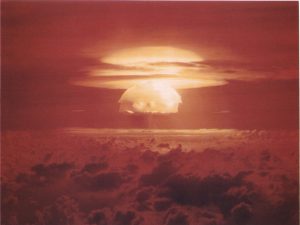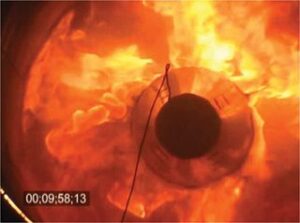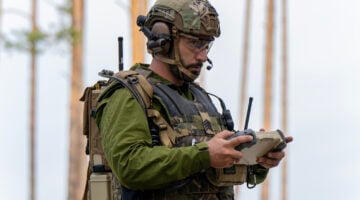
WASHINGTON: Lt. Gen. Robert Ashley, director of the Defense Intelligence Agency, said today that both Russia and China have the capacity to undertake explosive nuclear testing that would violate the 1996 Comprehensive Nuclear Test Ban Treaty (CTBT). So does the United States.
While Ashley and other senior Trump Administration officials speaking at the right-leaning Hudson Institute today suggested that Beijing and Moscow may be doing such tests, they refused to say so for sure — even when directly asked a yes-or-no question.

“Gen. Ashley seems to be sending a mixed message about whether the intelligence supports the fact that the Russians have the capability to conduct super-critical nuclear tests, or whether they have evidence that the Russians have exorcised that capability,” said Daryl Kimball, executive director of the Arms Control Association (a pro-arms control organization) after the round table.
“The United States believes that Russia probably is not adhering to the nuclear testing moratorium in a manner consistent with the zero-yield standard,” Ashley said in his prepared remarks. But when pressed by Hudson Institute moderator Rebeccah Heinrichs, he backed off. Instead he said only that DIA intelligence shows that the Russian Novaya Zemlya nuclear testing facility “has the capacity to operate in something other than zero yield.”
Further, when the Wall Street Journal’s Michael Gordon (who broke the story of US suspicions regarding Russian testing activities this morning) bluntly asked Ashley to explain whether he was saying that DIA believes the Russians have the capacity to test or are actually testing, Ashley replied: “I believe they have a capability to do that.” Note: he did not say that Russia had conducted treaty-busting tests.
With regards to China, Ashley was even less clear — essentially saying that given the extent of Chinese nuclear modernization underway, it is inconceivable that Beijing would not be doing explosive testing. He said that the combination of China’s myriad upgrade activities and the lack of transparency about them “raise questions as to whether China could achieve such progress without activities inconsistent with the Comprehensive Test Ban Treaty.”
A follow-up panel of senior Trump Administration policy officials did nothing to clear the murky waters that often seem to bubble up around public statements by US Intelligence Community (IC) representatives.
When asked about the State Department’s opinion, Thomas DiNanno, deputy assistant secretary for defense policy, emerging threats and outreach, said “we believe the Russians are probably engaged in that sort of testing.” (Emphasis ours).
Tim Morrison, the weapons of mass destruction guru at the National Security Council — and an acolyte of National Security Advisor John Bolton who has long been a critic of the CTBT — muddied the waters further. Morrison raised the question of whether Russia and China actually interpret the CTBT’s requirements in the same way as the US.

“With respect to what Russia and China are likely doing, it may come down to a simple question of how do they understand their obligations? Do they agree with the US that they are not permitted to conduct any tests that create a nuclear yield?” Morrison mused. “If so, to Gen. Ashley’s point, it raises questions about if they are in compliance. If they on the other hand believe that the CTBT allows them certain liberality with respect to these kinds of issues, maybe they think they are in compliance with the treaty.”
Russia signed the CTBT in 1996 and ratified it in 2000. Both China and the United States signed the treaty, but have yet to ratify it. Indeed, the Senate voted against ratification in 1999, and the treaty’s lack of definition of what “zero yield” actually meant was one of the reasons, according to John Harvey, who was the Office of the Secretary of Defense point man for CTBT during the Clinton Administration. The Obama Administration refrained from putting the treaty back before the Senate in 2009 for fear it would once again be voted down by the Republican majority. The Trump Administration in its 2018 Nuclear Posture Review said it would not seek CTBT ratification.
“Despite what you may hear from some,” Harvey told me, “there was never an agreement between the US and Russia regarding what “zero” meant.” He added that this lack of understanding “was reaffirmed by the IC 20 years ago.” He added that “if CTBT is ever to enter into force, the P5 (the five permanent members of the UN Security Council) must resolve this issue in a common understanding on a testing standard that all would adhere to.”
That said, the Arms Control Association asserted in a statement today that “Russia has repeatedly affirmed publicly that they believe the treaty prohibits all nuclear test explosions.” For example, the ACA pointed to the fact that Russian Deputy Foreign Minister Sergey Ryabkov noted in a 2017 op-ed that the treaty “prohibits ‘any nuclear weapon test explosion or any other nuclear explosion,’ anywhere on Earth, whatever the yield.”
Russia, China and the US all have long had the capacity to conduct explosive nuclear tests, Frank Rose, assistant secretary of state for arms control in the Obama Administration, told me. While Rose said he had not knowledge “one way or the other” of any CTBT violations by Russia or China, he said the administration statements on the issue “struck me as a bit odd” despite the fact that there is “no doubt” that both countries are working to modernize their arsenals.
Kimball was less reticent. “I would assert that he (Ashley) and the National Security Council representative (Morrison) are stretching the facts,” he said. “It is clear they are trying to paint Russia as a bad actor.”
If that’s true, it raises the question of what exactly the Trump Administration hopes to achieve by putting forward such allegations regarding Russian and Chinese nuclear testing at this time, a former US arms control official said. Further, he said, there has been no indication that the administration has officially sent a démarche to Moscow and Beijing to clarify the situation. (The State Department did not return a request for comment on whether that had been done.) While he said he doesn’t have a clear answer as to the administration’s motivation, the official told me, “if the objective is to raise questions about the viability of arms control in general, this would be one way to do it.”
President Donald Trump last month ordered administration officials to seek trilateral nuclear arms control negotiations with both Russia and China, as noted by Morrison today. That effort too has piqued skepticism from arms control advocates about whether the underlying motivations are to ensure the demise of nuclear arms control writ large, given that the Trump Administration has yet to decide whether it will renew the New START treaty when it expires in 2021. New START is the only bilateral arms control treaty that limits the number of US and Russian strategic nuclear warheads and delivery systems. Morrison refused to be drawn on that question as well, insisting that the White House has plenty of time to make up its mind.

